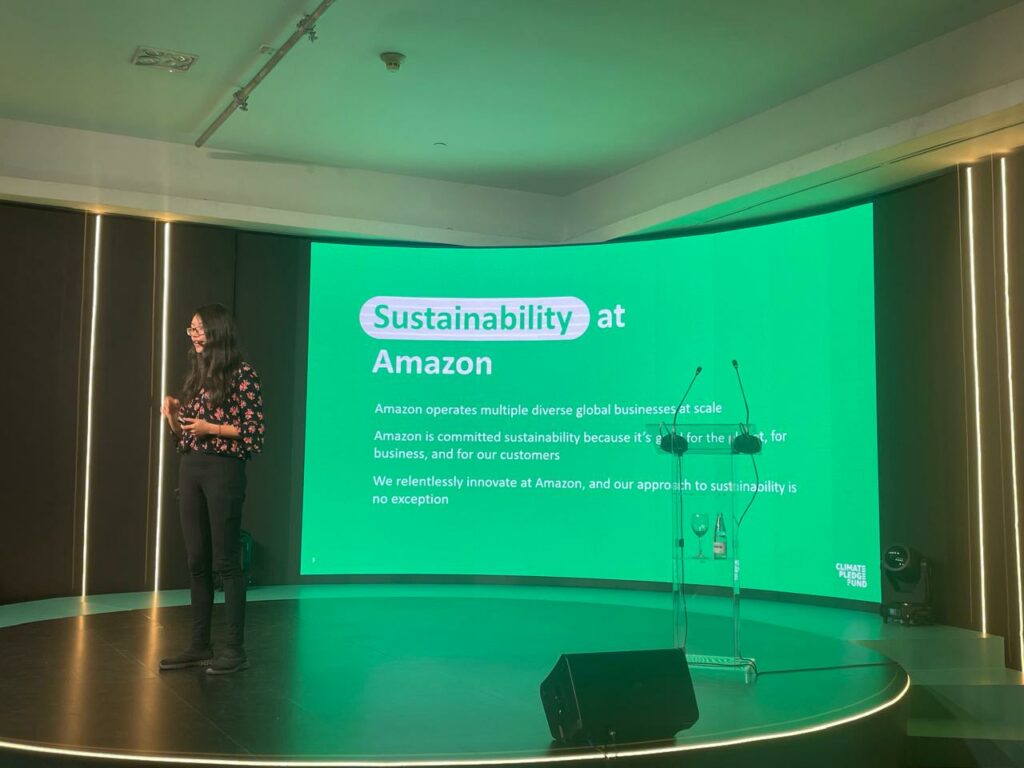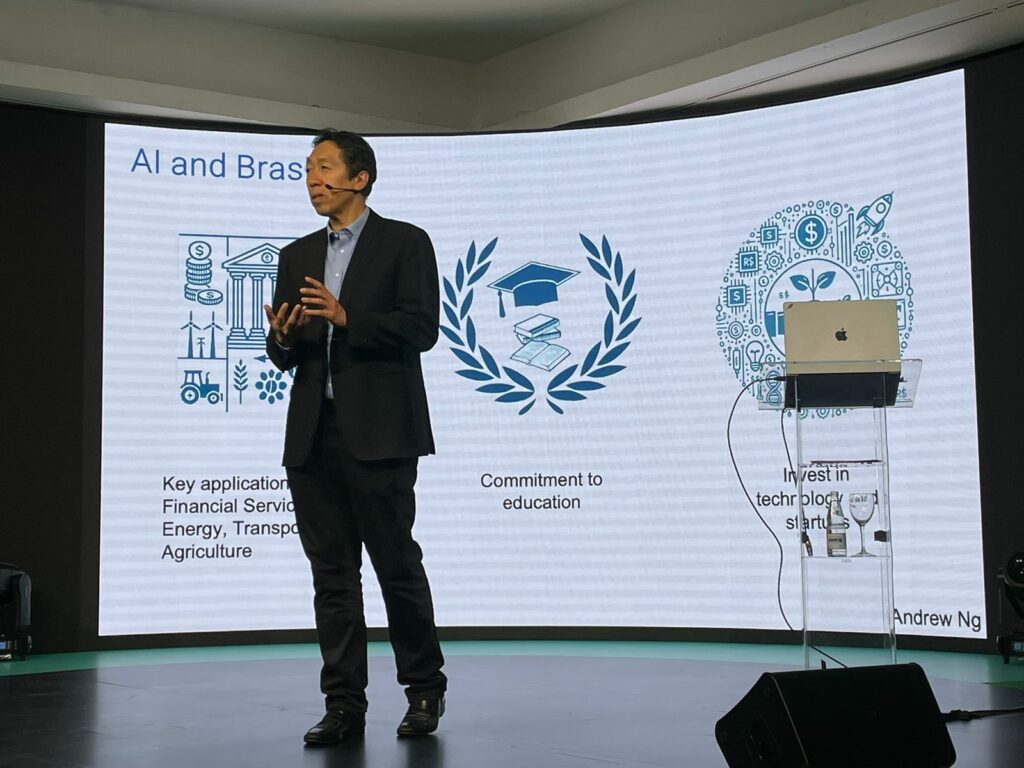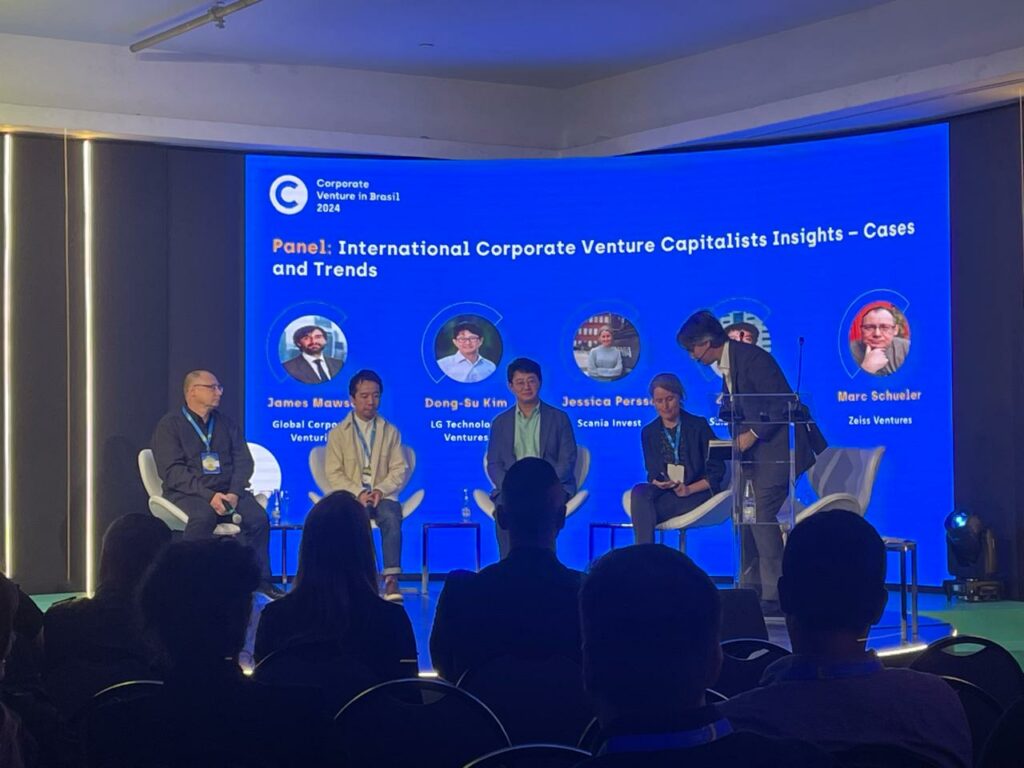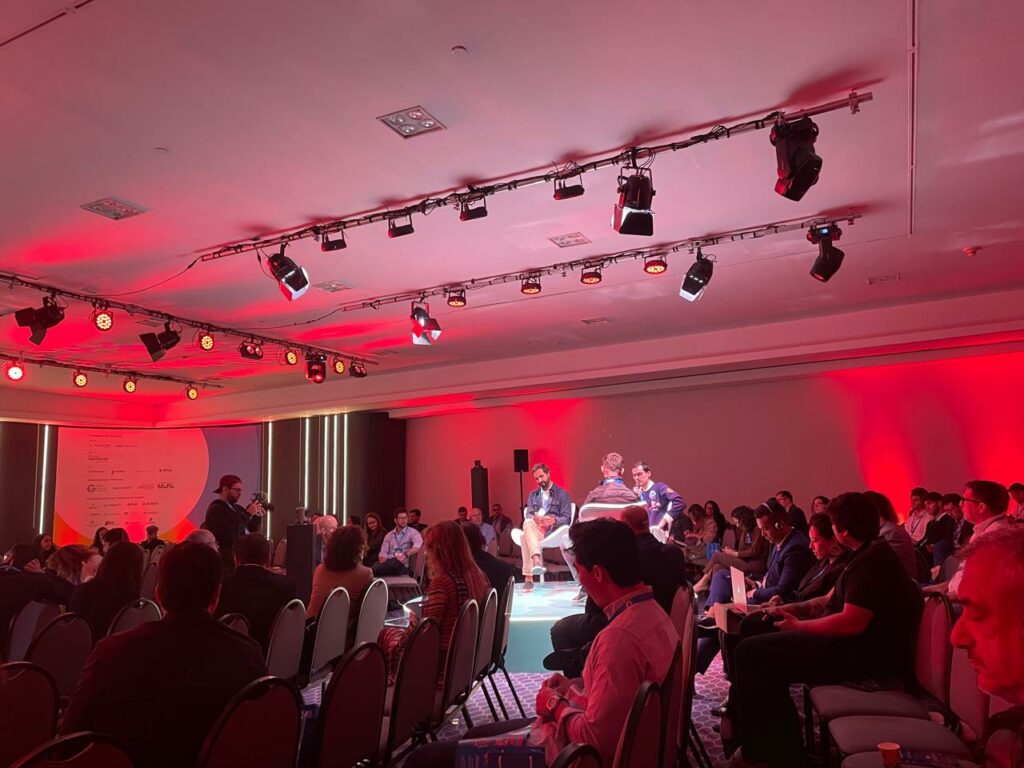By EloInsights
- CV in Brazil 2024 brought together major corporations and innovative startups in São Paulo, aiming to connect within the entrepreneurial ecosystem.
- Sustainability, energy transition, and artificial intelligence were among the key themes discussed this year.
- Fund managers shared their experiences, and the event concluded with the traditional CV Awards, a survey conducted by EloGroup.
Major players, funds with a strong appetite for investment, startups seeking to scale their innovations to larger audiences… The Corporate Venture in Brazil 2024 event, held in São Paulo on October 29-30, highlighted the dynamic landscape of Brazilian Corporate Venture Capital (CVC), showing increased investment activity and a focus on sustainability. The event was organized by Apex Brasil and GCV, with EloGroup as one of the institutional supporters.
Throughout dozens of talks, panels, and interviews, a notable trend emerged: global corporations and Brazilian companies are actively engaging with startups, leveraging their expertise and resources to drive innovation across various sectors. The event showcased successful partnerships, emerging trends, and key challenges faced by CVCs in the Brazilian market.
A major theme was the convergence of CVC investments with Environmental, Social, and Governance (ESG) principles. Companies such as Scania Invest and Vale Ventures discussed their investments in sustainable solutions, ranging from biofuels and electric vehicles to decarbonization in the mining industry.
Another topic that resonated among experts was Artificial Intelligence and its potential to unlock business opportunities across multiple verticals.
Below, we’ve selected some of the key insights from the event, which inspire a closer look at the full potential of cooperation between corporates and startups within the entrepreneurial ecosystem.
Phoebe Wang: The Amazon Climate Pledge Fund’s Commitment to Sustainability

Phoebe Wang, a representative of the Amazon Climate Pledge Fund, was one of the keynote speakers at the event. In her presentation, she outlined the fund’s commitment, backed by $2 billion in capital, to strategic areas such as sustainable manufacturing, focusing on materials with a lower environmental impact, especially in packaging. Another investment area is building technology, aiming to support solutions that reduce the environmental footprint in offices, distribution centers, and data centers. Additionally, Wang mentioned the fund’s interest in “green steel” and low-impact cement, which are part of its commitment to building a more sustainable future for global infrastructure.
Finally, Wang emphasized the focus on low-carbon transportation, highlighting the promotion of electric vehicles and the adoption of smart, efficient logistics. Other priority areas include sustainable food and agriculture, the circular economy, and electronics recycling, all aligned with the goal of promoting resource reuse and recycling practices.
Andrew Ng: Agents and Perspectives on Artificial Intelligence

Andrew Ng, a Stanford professor, founder of the Coursera platform, and one of the leading voices in Artificial Intelligence and Machine Learning, addressed key topics surrounding the impact of Artificial Intelligence on business during his keynote speech at CV in Brazil 2024.
Ng highlighted the difference between supervised learning and generative AI, clarifying how these technologies have distinct applications and how generative AI has accelerated the development of AI solutions, opening a range of opportunities for advanced automation and value creation in industries such as healthcare, finance, and education—areas he sees as having great potential in Brazil for this type of technology.
In this context, he emphasized that today, the layer of applications based on Artificial Intelligence is an excellent starting point for those looking to innovate in the field. In other words, developing applications that offer solutions based on specific use cases by leveraging the capabilities of Large Language Models from companies like OpenAI, Google, and others.
Finally, Ng discussed what he considers one of the fields with the greatest potential: Workflow with Agents. In other words, AI models capable of breaking down problems into various stages of resolution to achieve more accurate results.
Jessica Persson: Sustainable Innovation and Scania’s Commitment to CVC and Brazil
Jessica Persson, Head of Venture Capital and M&A at Scania Invest, the global venture capital arm of Scania—a Swedish company globally recognized for manufacturing heavy trucks, buses, and industrial and marine engines—participated in the event’s opening panel, where she highlighted the importance of the Brazilian market for the company. Persson emphasized the company’s commitment to CVC and noted that Brazil is a strategic market, currently representing 20% of Scania’s global truck market share.
Jessica also spoke about the need for distinct sustainability approaches in different markets; for example, in Brazil, the priority is on the use of biofuels, while in Europe, electric solutions will be the focus. She further highlighted that Scania is committed to exploring new technologies, such as autonomous driving and advanced energy storage, to maximize the efficiency of its products.
Dong-Su Kim: LG Technology Ventures' Approach and Opportunities in Brazil
Dong-Su Kim, CEO of LG Technology Ventures, the venture capital arm of the South Korean giant, brought a global perspective in discussing the role of CVC. Based in Silicon Valley, LG Technology Ventures represents seven different companies within the LG group and operates across a broad range of areas, including technology, materials, devices, and biotechnology. Kim shared that, although they have not yet made direct investments in Latin America, the event presents a valuable opportunity to explore the Brazilian market and establish connections that could facilitate future partnerships.
Kim emphasized that LG Technology Ventures seeks to maximize both the financial impact and the strategic value of its investments. He noted that Brazil has attractive sectors, such as fintech, aerospace, materials, and mining—especially relevant to the battery supply chain, a current focus for LG.
In his speech, Kim also explained the importance of a gradual and strategic approach when entering new markets, mentioning that LG Technology Ventures plans to start with smaller investments in Latin America. According to him, the initial goal is to learn more about the local ecosystem, understand the unique challenges of the market, and from there, build sustainable, long-term partnerships.
Ziheng Li: Brazilian Potential in the Fintech Market and Saison Capital’s Interest in the Local Ecosystem
Ziheng Li, Vice President of Saison Capital, the venture capital arm of Credit Saison, one of Japan’s leading financial companies, shared insights on the company’s growing interest in the Brazilian market, particularly in fintech, and its approach to Corporate Venture Capital. Saison Capital already has over 100 direct investments in companies worldwide, and Brazil now presents a strategic opportunity for the fund. Li explained that he recently moved to São Paulo to get closer to the local market and better understand its nuances. According to him, Saison Capital is particularly interested in supporting startups at the Series A stage, where capital is crucial for expansion and the consolidation of promising businesses.
In addition, Li emphasized Saison Capital’s interest in fostering a collaborative innovation ecosystem, creating partnerships and connections that add value for both local startups and the company itself. He highlighted that, by investing in Brazil, Saison Capital seeks not only financial returns but also the development of a network for learning and knowledge exchange that benefits all involved. Li concluded by affirming that Saison’s commitment to Brazil is long-term, with the expectation of contributing to the growth and strengthening of Brazil’s innovation ecosystem.
Marc Schueler: Precision Medicine and Zeiss’s Expansion into Software
Marc Schueler, Head of External Ventures at Zeiss Ventures, brought to CV in Brazil 2024 insights into Zeiss’s innovation approach, especially in the field of medical technology. Schueler explained that Zeiss, a leading German company in semiconductor technology, medical solutions, and consumer products, has been working to expand its operations beyond hardware, exploring new ways to integrate software into its products. High-precision diagnostics and applying technology to optimize medical treatment are areas of particular interest.
According to Schueler, this strategy involves direct investments and partnerships with startups, which drives Zeiss’s interest in the Brazilian entrepreneurial ecosystem.
He also mentioned the challenges Zeiss faces in operating in a new market like Brazil, including limited access to local information and the difficulty in gaining a deep understanding of the regional landscape.

Paula Puzzi: Partnerships with Startups and Suzano Ventures’ Investment Strategy
Paula Puzzi, Corporate Venture Capital Manager at Suzano Ventures, highlighted the importance of Suzano Ventures as the strategic investment arm of Suzano, a global leader in the pulp and paper industry. Paula explained that Suzano Ventures aims to leverage its natural assets, such as extensive eucalyptus farms, to develop advanced and sustainable materials, diversifying the company’s portfolio and promoting innovative practices within the circular economy.
She also discussed Suzano Ventures’ collaborative model, which includes partnerships with universities and Suzano’s own Research and Development (R&D) sector. The startups they invest in receive not only financial support but also access to these R&D resources, essential for scaling operations and driving innovation. Paula highlighted the success story with Alltrope Energy, a startup focused on lithium batteries and fast charging, which, in partnership with Suzano, is developing plant-based batteries.
Paula further discussed Suzano Ventures’ structured investment approach, the rigor of its due diligence processes, and the importance of portfolio management aligned with the corporate’s strategic objectives.
Transportation, Sustainability, Agribusiness... Startup Pitches at CV in Brazil 2024
Another highlight of the event was the startup pitches for potential investors. The pitches are presented in rounds of a few minutes, followed by questions from selected interviewers. This year, various startups pitched innovative solutions focused on sustainability, technology, and infrastructure.
David Noronha from Energy Source showcased a platform for lithium battery disposal and recycling, concentrating on the extraction of critical materials such as cobalt, lithium, and manganese, as well as battery repair. VoltBras, represented by Bernardo Durieux, introduced a structure for electric vehicle charging aimed at meeting the growing demand for charging points and improving the management of this process for operators and drivers.
The startup Aeroriver presented a potentially revolutionary river transport solution: a high-speed boat that “flies” two meters above the water, offering an agile and innovative alternative for navigation in riverside regions. In the energy sector, Igor Zanella and Guilherme Tremiliosi from Protium and Xield, respectively, discussed hydrogen production technologies, with Xield using ethanol as a raw material, proposing a solution with reduced dependence on fossil fuels.
The agricultural sector also stood out with Nagro, led by Gustavo Alves, which offers an app to facilitate access to rural credit for farmers, while Yak, represented by João Ozorio, showcased electric tractors with proprietary technology, promising significant savings compared to diesel.
MaisMu and BAT Brazil: An Example of Synergy Between Startups and Corporates

The partnership between the Brazilian startup MaisMu and BAT Brazil, a branch of British American Tobacco (BAT), was one of the success stories highlighted at CV in Brazil 2024. MaisMu, known for developing healthy food products and supplements, established a strategic collaboration with BAT Brazil through Btomorrow Ventures, the company’s Corporate Venture Capital arm. This investment is part of BAT’s global strategy to diversify its portfolio, expanding beyond tobacco and investing in new consumer products.
The collaboration with BAT allowed MaisMu to achieve significant market expansion. Through a distribution agreement with BAT Brazil, the startup expanded its sales network to 40,000 points of sale within just six months. In comparison, MaisMu had reached 10,000 points of sale over ten years through its own efforts. In addition to distribution support, BAT provided access to strategic resources and expertise to scale the business, enabling MaisMu to gain visibility and competitiveness in the healthy foods sector at an accelerated pace.
The partnership between BAT and MaisMu serves as a practical example of how a large corporation and a startup can combine their strengths to form a “hybrid car,” as described by Otto Guarnieri, co-founder of MaisMu. He compared the corporation to a gasoline car—slower to accelerate but with great range—while the startup is like an electric car, accelerating quickly but with scale limitations.
Vale Ventures: Pursuit of Sustainability in Mining
Bruno Arcadier, Head of Vale Ventures, participated in a panel on innovations in the energy sector driven by corporate capital. He highlighted the importance of Corporate Venture Capital for Vale, one of the world’s largest mining companies. Arcadier emphasized that Vale Ventures, with a $100 million fund, seeks to invest in startups developing disruptive technologies aligned with the company’s strategic objectives. Areas of interest include decarbonization, circular mining, metals for the energy transition, and innovations that transform mining operations.
Arcadier noted that Vale Ventures has already made significant investments, such as in Mantel, a startup developing innovative carbon capture technology, and Allonnia, focused on biotechnology for sustainable mining solutions. He explained that these partnerships aim not only for financial returns but also to add strategic value, promoting more sustainable and efficient practices in the mining sector.
Technological Trends to Solve Major Challenges
In a panel on technological trends, Tamara Steffens, Managing Director at Thomson Reuters Ventures, expressed interest in Brazilian startups capable of using artificial intelligence to tackle the challenges of Brazil’s complex tax system. She highlighted the relevance of AI in simplifying and resolving tax issues, bringing greater efficiency and compliance to the sector.
Jonas Ide, Investment Manager at Evonik Venture Capital, focused on opportunities in the energy transition and the adoption of new renewable sources. He pointed out the specific challenges of deep techs, which require long development periods, government support, and significant financial investment, emphasizing the importance of partnerships and strategic investments to make these innovations viable.
Sunidh Jani, Director of Business Development and Venture Investments at Eaton Ventures, discussed energy interoperability and distributed energy forms. He explored topics such as charging infrastructure, alternative energy sources, nuclear fusion, and quantum computing. Jani emphasized the need to develop technologies that integrate different energy systems, promoting efficiency and sustainability in the sector.
Banco BV and Ambev: The "Time for Innovation" and Governance Challenges
In another panel on CVC learnings, Jimmy Lui, Superintendent of Innovation and Corporate Venture Capital at Banco BV, discussed the importance of disciplining the time and culture of innovation within companies. He emphasized that the “innovation clock” operates differently from the traditional operational pace of companies, requiring effective internal communication so that everyone understands this difference and the longer development cycles involved. Lui also highlighted the inherent volatility of Corporate Venture Capital and the need to develop robust and resilient institutional investment theses to address the challenges of this type of investment.
Luciana Sater, Head of Investments at Ambev, discussed the importance of structuring partnerships and investments for innovation. She noted that for companies at the beginning of their CVC journey, it is essential to engage closely with the ecosystem and build a strong knowledge base. Luciana also mentioned that Corporate Venture Capital strategies differ significantly from Mergers and Acquisitions (M&A) strategies, requiring strategic alignment to ensure well-defined investment theses. To achieve this, she suggested the establishment of investment committees, strengthening governance and guiding investments so that innovation impacts are aligned with the organization’s objectives.
Closing: Corporate Venture in Brazil Awards
CV in Brazil 2024 concluded with the traditional Corporate Venture in Brazil Awards ceremony. Jaime Frenkel, a partner at EloGroup, took the stage to present one of the awards and highlighted the company’s contribution to the research underlying the awards. Frenkel also emphasized the essential role of initiatives like this in promoting the growth, maturity, and expansion of the Corporate Venture Capital market in Brazil.
The award winners in the four categories were as follows:
- Most Active CVC (number of deals): Unifique Tech Ventures
- Largest Investment: Banco do Brasil (BB Ventures)
- Largest Exit: BTG Pactual (boostlab) – Celcoin and Evertec + Sinqia (Torq Ventures) – Celcoin
- Largest Fundraising Announcement: Eurofarma Laboratórios S.A. (Eurofarma Ventures) – $100 million











